Where did the false teaching, which Hitler popularized, and Israel continues to use as the foundation for its racist Apartheid policies on “genetic identification” who is Jewish and not Jewish (which discriminates against Ethiopian Jews and others who are not part of the Caucasian race), not welcomed nor wanted, in Israel:
“…Singling out of Jews for special discriminatory identification…” make that “racial profiling” of a religion. Hitler and the Soviets, were both equally guilty of researching individuals' backgrounds for ancestors who practiced Judaism, and deemed them as part of the pseudo-scientific quackery, “Jewish race” myth. In short, Nazi Germany and the Soviet Union created the “excuse” for Israel to exist.
The Morning Call Paterson, New Jersey Friday, November 18, 1966 - Page 25
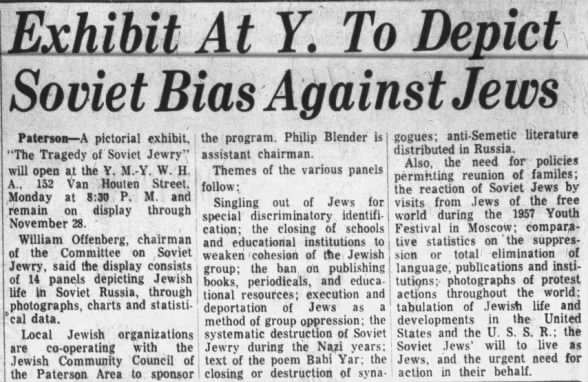 Exhibit At YMCA To Depict Soviet Bias Against Jews 18 Nov 1966, Fri The Morning Call (Paterson, New Jersey) Newspapers.com
Exhibit At YMCA To Depict Soviet Bias Against Jews 18 Nov 1966, Fri The Morning Call (Paterson, New Jersey) Newspapers.com
Russians Force Closing of Synagogue In Ukraine
 Russians Force Closing of Synagogue In Ukraine 27 Jul 1959, Mon The York Dispatch (York, Pennsylvania) Newspapers.com
Russians Force Closing of Synagogue In Ukraine 27 Jul 1959, Mon The York Dispatch (York, Pennsylvania) Newspapers.com
Soviet Racism
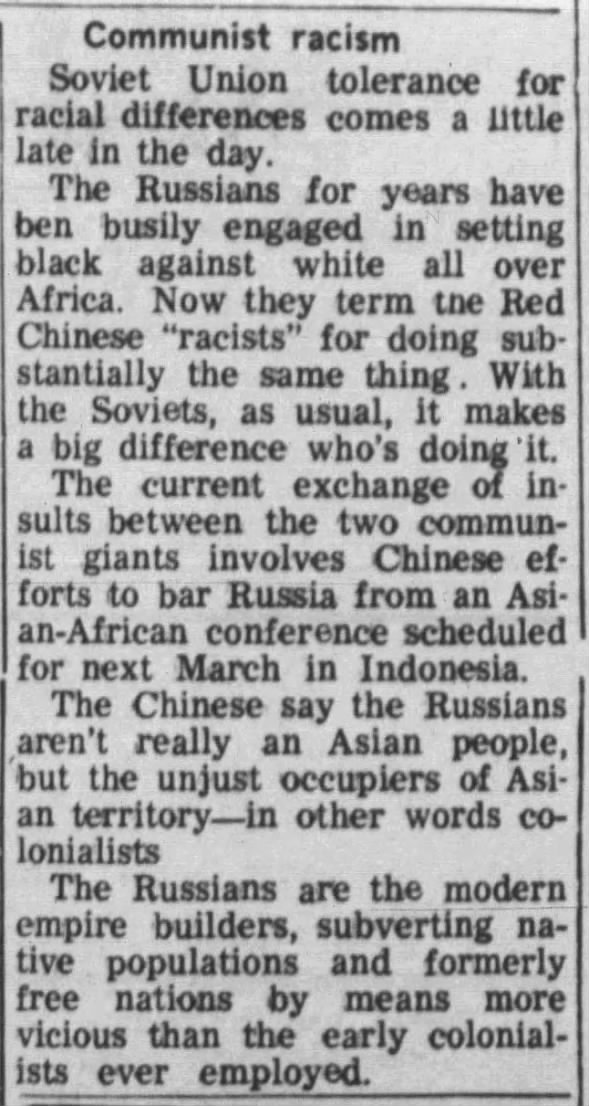 Soviet Racism 23 Jul 1964, Thu The Lyman Nebraska Leader (Lyman, Nebraska) Newspapers.com
Soviet Racism 23 Jul 1964, Thu The Lyman Nebraska Leader (Lyman, Nebraska) Newspapers.com
Singer Fights Racism in Soviet Union
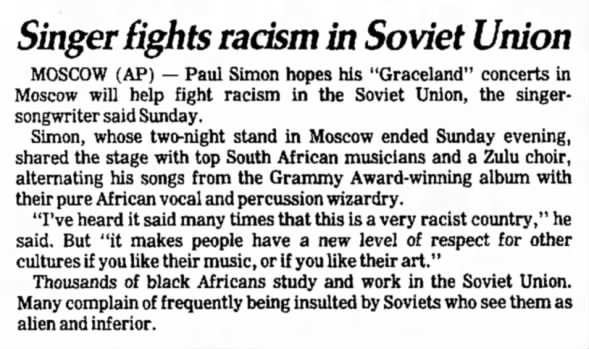 Singer Fights Racism in Soviet Union 26 Jun 1989, Mon The Salina Journal (Salina, Kansas) Newspapers.com
Singer Fights Racism in Soviet Union 26 Jun 1989, Mon The Salina Journal (Salina, Kansas) Newspapers.com
Blacks in the Soviet Union Suspect Odd Incidents are due to RACIAL PREJUDICE
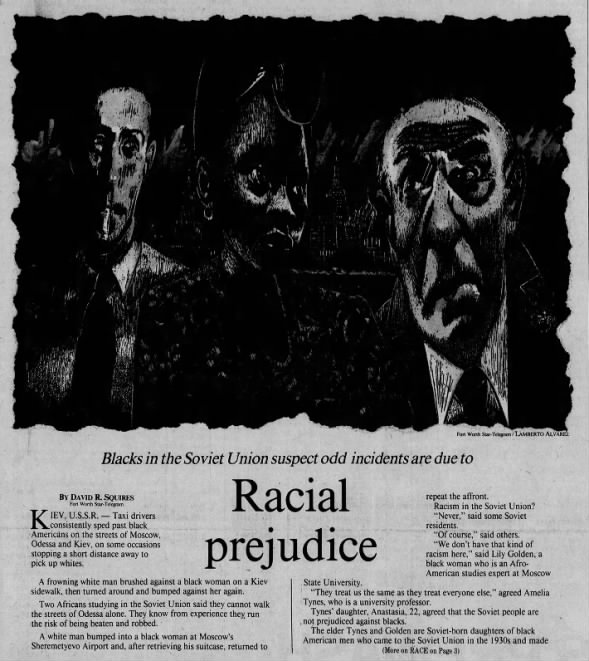 Blacks in the Soviet Union Suspect Odd Incidents are due to RACIAL PREJUDICE 25 Aug 1989, Fri Fort Worth Star-Telegram (Fort Worth, Texas) Newspapers.com
Blacks in the Soviet Union Suspect Odd Incidents are due to RACIAL PREJUDICE 25 Aug 1989, Fri Fort Worth Star-Telegram (Fort Worth, Texas) Newspapers.com
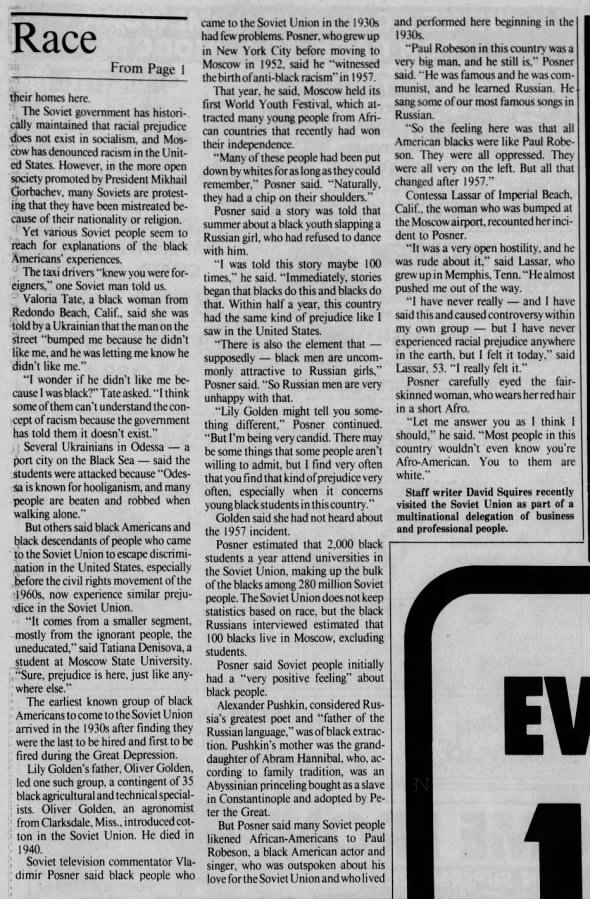 Race 25 Aug 1989, Fri Fort Worth Star-Telegram (Fort Worth, Texas) Newspapers.com
Race 25 Aug 1989, Fri Fort Worth Star-Telegram (Fort Worth, Texas) Newspapers.com
“I think some of them can't understand the concept of racism because the government has told them it doesn't exist.”
Fort Worth Star-Telegram Fort Worth, Texas Friday, August 25, 1989 - Page 89
Blacks in the Soviet Union suspect odd incidents are due to RACIAL PREJUDICE by David. R. Squires
Kiev, U.S.S.R. — Taxi drivers consistently sped past black Americans on the streets of Moscow, Odessa and Kiev, on some occasions stopping a short distance away to pick up whites.
A frowning white man brushed against a black woman on a Kiev sidewalk, then turned around and bumped against her again.
Two Africans studying in the Soviet Union said they cannot walk the streets of Odessa alone. They know from experience they run the risk of being beaten and robbed.
A white man bumped into a black woman at Moscow's Sheremetyevo Airport and, after retrieving his suitcase, returned to repeat the affront.
Racism in the Soviet Union? “Never,” said some Soviet residents.
“Of course,” said others.
“We don't have that kind of racism here,” said Lily Golden, a black woman who is an Afro-American studies expert at Moscow State University.
“They treat us the same as they treat everyone else,” agreed Amelia Tynes, who is a university professor.
Tynes' daughter, Anastasia, 22, agreed that the Soviet people are not prejudiced against blacks.
The elder Tynes and Golden are Soviet-born daughters of black American men who came to the Soviet Union in the 1930s and made their homes here.
The Soviet government has historically maintained that racial prejudice does not exist in socialism, and Moscow has denounced racism in the United States. However, in the more open society promoted by President Mikhail Gorbachev, many Soviets are protesting that they have been mistreated because of their nationality or religion.
Yet various Soviet people seem to reach for explanations of the black Americans' experiences.
The taxi drivers “knew you were foreigners,” one Soviet man told us.
Valorie Tate, a black woman from Redondo Beach, Calif., said she was told by a Ukrainian that the man on the street “bumped me because he didn't like me, and he was letting me know he didn't like me.”
“I wonder if he didn't like me because I was black?” Tate asked. “I think some of them can't understand the concept of racism because the government has told them it doesn't exist.”
Several Ukrainians in Odessa — a port city on the Black Sea — said the students were attacked because “Odessa is known for hooliganism, and many people are beaten and robbed when walking alone.”
But others said black Americans and black descendants of people who came to the Soviet Union to escape discrimination in the United States, especially before the civil rights movement of the 1960s, now experience similar prejudice in the Soviet Union.
“It comes from a smaller segment, mostly from the ignorant people, the uneducated,” said Tatiana Denisova, a student at Moscow State University. “Sure, prejudice is here, just like anywhere else.”
The earliest known group of black Americans to come to the Soviet Union arrived in the 1930s after finding they were the last to be hired and first to be fired during the Great Depression.
Lily Golden's father, Oliver Golden, led one such group, a contingent of 35 black agricultural and technical specialists. Oliver Golden, an agronomist from Clarksdale, Miss., introduced cotton in the Soviet Union. He died in 1940.
Soviet television commentator Vladimir Posner said black people who came to the Soviet Union in the 1930s had few problems, Posner, who grew up in New York City before moving to Moscow in 1952, said he “witnessed the birth of anti-black racism” in 1957.
That year, he said, Moscow held its first World Youth Festival, which attracted many young people from African countries that recently had won their independence.
“Many of these people had been put down by whites for as long as they could remember,” Posner said. “Naturally, they had a chip on their shoulders.”
Posner said a story was told that summer about a black youth slapping a Russian girl, who had refused to dance with him.
“I was told this story maybe 100 times,” he said. “Immediately, stories began that blacks do this and blacks do that. Within half a year this country had the same kind of prejudice like I saw in the United States.
“There is also the element that — supposedly — black men are uncommonly attractive to Russian girls,” Posner said. “So Russian men are very unhappy with that.
“Lily Golden might tell you something different,” Posner continued. “But I'm being very candid. There may be some things that some people aren't willing to admit, but I find often that you find that kind of prejudice very often, especially when it concerns young black students in this country.”
Golden said she had not heard about the 1957 incident.
Posner estimated that 2,000 black students a year attend universities in the Soviet Union, making up the bulk of the blacks among 280 million Soviet people. The Soviet Union does not keep statistics based on race, but the black Russians interviewed estimated that 100 blacks live in Moscow, excluding students.
Posner said Soviet people initially had a “very positive feeling” about black people.
Alexander Pushkin, considered Russia's greatest poet and “father of the Russian language,” was of black extraction. Pushkin' mother was the grand-daughter of Abram Hannibal, who, according to family tradition, was an Abyssinian princeling bought as a slave in Constantinople and adopted by Peter the Great.
But Posner said many Soviet people likened African-Americans to Paul Robeson, a black American actor and singer, who was outspoken about his love for the Soviet Union and who lived and performed here beginning in the 1930s.
“Paul Robeson in this country was a very big man, and he still is,” Posner said. “He was famous and he was communist, and he learned Russian. He sang some of our most famous songs in Russian.
“So the feeling here was that all American blacks were like Paul Robeson. They were all oppressed. They were all very on the left. But all that changed after 1957.”
Contessa Lassar of Imperial Beach, Calif., the woman who was bumped at the Moscow airport, recounted her incident to Posner.
“It was very open hostility, and he was rude about it,” said Lassar, who grew up in Memphis, Tenn. “He almost pushed me out of the way.
“I have never really — and I have said this and caused controversy within my own group — but I have never experienced racial prejudice anywhere in the earth, but I felt it today,” said Lassar, 53. “I really felt it.”
Posner carefully eyed the fair-skinned woman, who wears her red hair in a short Afro.
“Let me answer you as I think I should,” he said. “Most people in this country wouldn't even know you're Afro-American. You to them are white.”






















